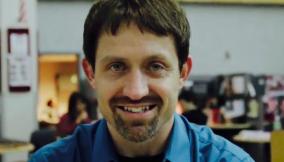When Opportunity Meets Preparedness: Digital Age Pedagogy Website Houses Emergency Remote Learning Resources
When Opportunity Meets Preparedness: Digital Age Pedagogy Website Houses Emergency Remote Learning Resources
By Tyler Dahlgren
Born out of a BlendEd pilot program established by a committee comprised of the Educational Service Unit Coordinating Council (ESUCC), professionals from select ESUs and the Nebraska Council of School Administrators (NCSA), the Digital Age Pedagogy site initially existed as a hub for resources illustrating best practices in blending online and offline instruction to enhance teaching and learning.
The ESU-NCSA BlendEd Pilot project approached best practices in blended learning from a systems level, focusing on administrators, technology coordinators and educators.
“We’re trying to promote differentiation during direct instruction, so that students get the instruction they need at the level that they need it,” said Dr. Nicholas Ziegler, Technology Integration Specialist and World Language Coordinator at ESU 5. “We’re also trying to promote some degree of student control over how they practice that content and how they are showing what they know. We’re promoting self-regulated learning, or student autonomy, through things like self-assessment.”
To this day, more than a dozen of the original 27 Nebraska school districts that made up the first cohort are still promoting and expanding their use of best blended learning practices.
“That’s extremely exciting,” said Ziegler. “They’ve done extremely good work.”
When the COVID-19 pandemic altered the course of education like nothing has before and forced every school in Nebraska to close their doors to students, the Digital Age Pedagogy website became, in an extremely short amount of time, an integral resource in itself for school leaders and educators searching for short-notice guidance on Emergency Remote Learning.
“We’re in an unprecedented moment in time, and the real goal is to help educators think through manageable expectations and towards manageable chunks of information that they can engage students with over the span of a week.” said Ziegler.
The site is easy to navigate and directs instruction towards the two options provided by the Nebraska Department of Education (NDE) in its recently-issued Continuity of Learning Plans guidance document; Educational opportunities and enrichment opportunities.
Educational opportunities are defined as teacher-led learning experiences that incorporate research-based practices and direct instruction. The website houses weekly plan templates for student learning, designed to ensure students are grasping objectives and meeting learning goals.”
Enrichment opportunities, meanwhile, allow students to progress at their own pace on their own path, with less emphasis on instruction in mastery-based approach.
“Our recommendation to educators is to really consider that student-learning experience,” Ziegler explained. “If we’re thinking through enrichment opportunities, let’s engage kids in those gamified, independent learning platforms, which are highly-engaging. Kids will have fun while solidifying their understanding of those core concepts, those core skills, inside of that continuum or continuation of learning in a grade level or across grade levels.”
While it remains unclear when life, inside and outside of the educational realm, will return to normal, Ziegler believes that when we do reach that point, experiences shared over the next several months are going to ultimately prove beneficial.
“If we can get educators on board with creating these student learning plans and manageable expectations, then once we get moving forward, whenever that may be, we are going to be in a good spot to then push people even further into diving into those resources around blended-learning practices,” he said.
The website was created through a collaborative effort. Ziegler can’t stress that fact enough. As many as six ESUs and the ESUCC were represented on the leadership team that worked tirelessly to morph the site into something suited for the immediate needs of school districts struck with the reality of having to separate students from teachers in the middle of March.
Right now, those districts are doing whatever it takes to keep the 2019-20 school year on the tracks. Down the road, though, moving forward in such uncertainty will pay dividends.
“We feel that engaging educators with these resources throughout remote learning will enhance educator effectiveness, improve student performance and lead towards a transformation of classroom instruction,” said incoming ESUCC Digital Learning Coordinator Andrew Easton.
Speaking of collaboration, the ESU leadership team Ziegler mentioned is teaming up with NDE to hold the Future Ready Conference on June 15 and 16. The online conference is totally free and open for all educators. The first day will focus on supporting educators in remote learning, while the second will be geared more towards transforming classroom instruction. The Future Ready Conference will have strands for administrators, tech coordinators, guidance counselors, librarians, and post-secondary educators too.
“It’s very possible that at the beginning of this next academic year, either across the state or in pockets inside of our state, we’re still going to have remote learning occurring, so the conference is really going to look at what we’ve done and what we can do to leverage our plans moving forward,” said Ziegler. “The main goal of the conference is to help students be successful in today and tomorrow’s job markets.”
The website, much like the landscape of education, will continue to evolve, a fluid home to remote learning resources and professional learning opportunities. Ziegler encourages educators and administrators to explore the site and all it has to offer.
“It’s meant to be free and open,” said Ziegler. “All of the content is licensed creative commons. We just ask that you attribute us, the digital age pedagogy team, and you don’t profit off of the resources. It’s imperative, now more than ever, that we come together and share what’s working well, what’s not working well, and that we are flexible and willing to adapt to meet the needs of the times.”
If the education community comes together in this time, then an adage Ziegler often hears from ESUCC Director Dr. Kraig Lofquist will continue to ring true.
“Dr. Lofquist feels that this is an example where opportunity has met preparedness,” said Ziegler. “Over the past decade, we have worked to solidify our understandings of best practices around digital age pedagogy, and in short order we were able to adapt those resources to meet the need of emergency remote learning.”




